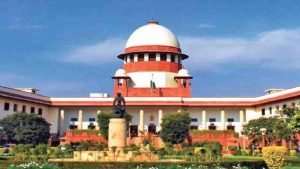Supreme Court lays down guidelines for premature release, remission of convicts

Highlighting the importance of holistically considering applications for premature release or remission of eligible convicts, the Supreme Court has laid down factors for the remission board or the government to consider while deciding on such petitions.
The Bench of Justice S. Ravindra Bhat and Justice Prashant Kumar Mishra recently observed that while deciding on remission, the board or the government should consider the potential of the convict to commit crimes in the future; his socio-economic conditions, age, state of health, familial relationships, the possibility of reintegration and the extent of earned remission.
It should further take in view the post-conviction conduct including, but not limited to, whether the convict has attained any educational qualification while in custody, volunteer services offered, job or work done, jail conduct, whether they were engaged in any socially aimed or productive activity, and the overall development as a human being;
As per the Apex Court, it was important to consider whether there was any fruitful purpose in continued incarceration of the convict.
It said the remission board should not entirely rely either on the reports of the presiding judge who conducted the trial or the police.
The Bench noted that a stereotypical approach to deny remission would defeat the object of remission, which was to limit incarceration of reformed convicts for long periods.
It further pointed out that undue weightage should not be given to the adverse opinion of only one member of a remission board like the presiding judge who conducted the trial.
The Apex Court observed that the discretion that the executive was empowered within executing a sentence, would be denuded of its content, if the presiding judge’s view, which was formed in all likelihood, largely (if not solely) on the basis of the judicial record, was mechanically followed by the concerned authority.
It said such an approach had the potential to strike at the heart and subvert the concept of remission as a reward and incentive encouraging actions and behaviour geared towards reformation in a modern legal system.
The top court of the country opined that an overemphasis on the presiding judge’s opinion, while disregarding the comments of other authorities, would render the decision on remission unsustainable.
Noting that the presiding judge’s view did have real weight, it said that a trial court judge’s report, however, could not be predominantly relied on to decide on remission, particularly if the judge’s report focused only on the crime, giving ‘little or no attention’ to the criminal.
The Apex Court passed the order on a petition filed by a person, who was convicted by a Bihar trial court in 2001 in a murder case. The convict had argued that he had spent over 24 years behind bars.
The Remission Board had rejected his application for premature release twice on the grounds of adverse opinions given by the presiding judge in both rounds and by the Superintendent of Police (SP) in the second round.
The Patna High Court had also dismissed his plea for non-prosecution leading to the filing of the petition before the Supreme Court.
The Supreme Court noted that both the reports submitted by the presiding judge contained a ‘casual opinion,’ which was based solely on the judicial record of conviction.
It observed that the trial judge only offered a dated insight on the convict since the judge had limited opportunities to examine the progress made by the convict during his sentence.
The Bench further noted that in reality, trial court judges do not exercise discretion during sentencing by looking at a wide range of factors concerning the accused.
It also took in view the adverse report of the SP, which should have been weighed after considering the possible biases involved, since the deceased in the case were policemen.
While dismissing the petition, the Apex Court directed the remission board to reconsider the petitioner’s remission plea within three months.
Convict Rajendra Mandal was represented by Advocate Randhir Kumar Ojha, while the State of Bihar was represented by Advocates Azmat Hayat Amanullah and T.G. Shahi.
(Case title: Rajo vs State of Bihar and ors)
The post Supreme Court lays down guidelines for premature release, remission of convicts appeared first on India Legal.
from India Legal https://ift.tt/hgNcu9Q
Comments
Post a Comment